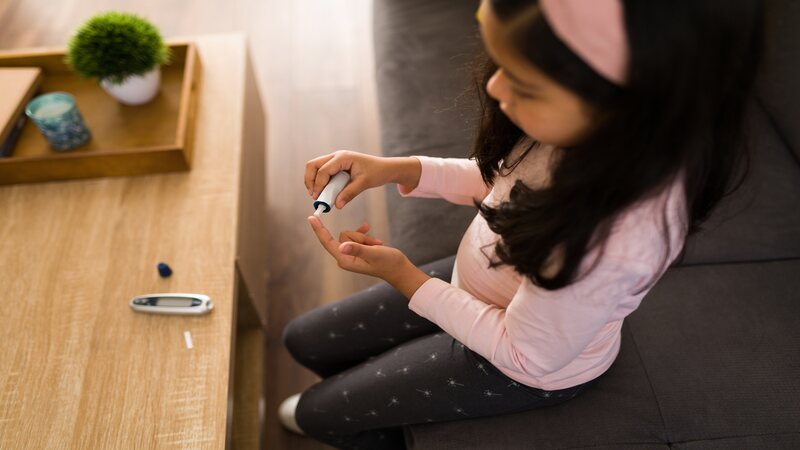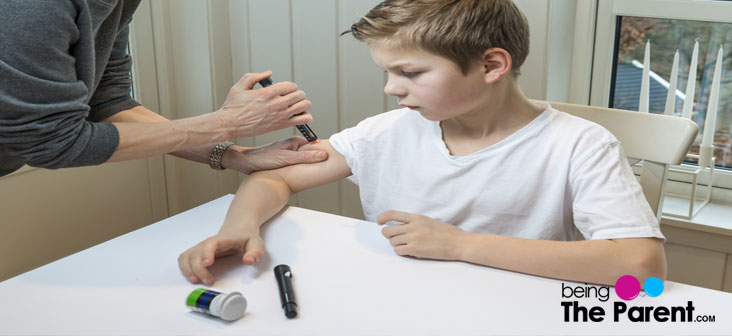
It is shocking to see the number of diabetic patients considerably increasing throughout the world. And unfortunately children are no exception. This disease is affecting children of all ages and the rate of diabetes among children is going up tremendously. Diabetes is a chronic condition that requires close monitoring throughout your child’s life. Nevertheless, with some handy information, as a mother, you can become your child’s most vital partner in figuring out how to live with this disease and manage it well.
What Is Diabetes In Children?
The sugar in the food we eat is converted into glucose and the blood circulates this glucose to different cells, tissues, and organs like brain. Glucose is an important source of energy for the cells in the body. However, an increased level of glucose in the blood will damage the cells, tissues and organs. The hormone insulin produced by the pancreas plays a significant role in regulating the sugar levels in the blood. Diabetes occurs when the body’s capacity to deliver insulin or react to the hormone insulin is disabled, causing elevated levels of glucose in the blood.
Three Types Of Diabetes In Children
- Type 1 (insulin-dependent diabetes or juvenile diabetes): This is the most commonly found diabetes among children. Type 1 diabetes occurs when the pancreas is unable to produce insulin. Since insulin is absent, the cells will not be able to absorb the sugar from the blood and convert it into energy that the body needs. This results in high blood sugar levels
- Type 2: Type 2 diabetes is uncommon among the children. However, the number of children with type 2 diabetes are showing an increasing trend recently. Here, though the pancreas is still making insulin, the production will be either very slow to meet the needs or the body develops resistance to insulin
- Prediabetes:Prediabetes is a condition in which levels of blood sugar are high but not high enough to diagnose it as diabetes. If prediabetes condition is controlled, then it can delay the onset of Type 1 or Type 2 diabetes in children
A lot of times both parents and doctor overlook the symptoms of prediabetes and diabetes which can further complicate things. It can lead to a condition called diabetic ketoacidosis (DKA), a leading reason of morality in kids with Type I diabetes
What Causes Diabetes In Children?
Here are some causes of diabetes in children:
- Type 1: Type 1 diabetes happens when the immune system of the child attacks the islet cells in the pancreas, which produces the insulin, mistaking it for a foreign body and destroys it. Once the islet cells are destroyed, the child’s pancreas cannot produce insulin. Although no one knows for certain why this happens, but genes are known to cause it. It is a genetic disease that can be passed from a parent or an ancestor. But just getting the genes for diabetes are usually not enough to cause type 1 diabetes. In all probability the child would then have to be exposed to some virus to cause type 1 diabetes
- Type 2: Even though the exact reason is not yet known, unhealthy lifestyle, food habits, and lack of outdoor activities can be the main cause of insulin resistance that results in type 2 diabetes in children. Heredity can also play a significant role. In fact, a substantial percentage of the kids with type 2 diabetes have both or at least one parent with diabetes.
Similarly obesity is another culprit as the extra fats make it difficult for the cells to respond to insulin. Similarly, if the child is “less active” or lives a sedentary lifestyle, he has a higher chance of developing type 2 diabetes as an inactive body struggles to regulate insulin
What Are The Symptoms Of Diabetes In Children?
-
- The symptoms of type 1 diabetes in children:
- Sudden mood swings: The children will suddenly turn moody, restless or irritable. Though it can be a symptom of various other problems, if sudden mood change appears along with other symptoms, you can suspect diabetes
- Changes in vision: Your child may experience blurred vision or other eyesight problems if he is suffering from diabetes. This is because in diabetes the concentration of sugar is high in blood and just like from other cells and tissues, the fluid may be drawn from the lenses of your child’s eyes too. This may affect your child’s ability to focus clearly. Unfortunately, if your child is too young, he or she may not be able to understand this. But eventually you can figure it out
- Abdominal pain, nausea or vomiting: Recurring stomach pain can sometimes be a sign of diabetes. This occurs when high blood glucose levels slow down the peristalsis, an involuntary contraction and relaxation of the muscles of the intestine that move food along the digestive tract. This result in retention of food in the stomach for longer period than usual. This sometimes can cause stomach pain, nausea and vomiting in your child
- Yeast infection: The children with type 1 diabetes are more prone to yeast infection. Babies are more prone to get diaper rashes. Girls are more prone to vaginal yeast infection
- The symptoms of type 2 diabetes in children:
- Unexplained weight loss: A sudden weight loss, in spite of increased appetite, could be a sign of type 2 diabetes in children
- Frequent infection: As the resistance power of your child is impaired when he suffers from type 2 diabetes thus making him more prone to various infections
- Skin darkening: Acanthosis nigricans, a skin condition characterized by dark and thickened patches on skin especially in the folds and creases like armpit, between fingers, groin, elbows, knees and neck. These dark patches are a significant sign of insulin resistance
- The symptoms of type 1 diabetes in children:

- Other symptoms of diabetes in children
- Increased thirst: As the amount of sugar increases in the child’s bloodstream, fluid from the tissues will draw out accordingly. In addition, the frequency of urination and volume of urination increases when the child is diabetic. This will make the child thirsty all the time
- Extreme Fatigue: The child suffering from diabetes may seem extremely tired or sleepy as his body will not have enough sugar to provide energy for normal body functions
- Increased urination: Increased intake of water results in increased frequency and quantity of urination. Even your potty-trained child may start to wet the bed in his sleep
- Increased hunger: Glucose or sugar is the energy source of tissues and organs. Without insulin, the cells will not be able to absorb the glucose from the blood. If your kid’s body is not receiving sufficient energy, it can lead to extreme hunger in the child as food becomes the next best source of energy
- Fruity smelling breath: A fruity-smelling breath is another common indication of diabetes in children. When the child’s body does not have adequate insulin to turn sugar into energy, it will use fat as an alternative. When the fat breaks down, byproducts called ketones gets accumulated in the body. This is responsible for the fruity smelling breath
- Slow-healing sores: Any kind of sores or infections that takes time to heal may be a sign of type 2 diabetes in children
Diagnosis Of Diabetes In Children
If any of the symptoms indicate diabetes in your child, the doctor may recommend some tests to diagnose the condition. These test include:
- Random blood sugar test: This test is conducted to test the level of blood sugar in the child at any random time. If the test results show high sugar level then the doctor may confirm diabetes. But if the test results come out normal but the doctor still suspects diabetes in your child, he may order further tests to determine the pattern of blood sugar levels
- Glycated hemoglobin test: This test is conducted to know your child’s average blood sugar levels for the past two or three months. The test is also known as A1C test and it measures the percentage of blood sugar stuck in hemoglobin. If the levels of A1C is higher than 6.5 in two separate test then it will indicate diabetes in children
- Fasting blood sugar test: Some doctors may recommend fasting blood sugar test. In this test, blood sample will be taken after an overnight fast
If your child is diagnosed with diabetes, the doctor will also run blood test to check for autoantibodies in order to know the type of diabetes the child has. If diabetes is confirmed, the doctor may refer your child to a pediatric endocrinologist who is a doctor who specializes in treating children with diseases related to the endocrine system and diabetes is one such disease. Pediatric endocrinologist will then design a course of treatment for your child.
How To Treat Diabetes In Children?
The treatment and management of diabetes is a lifelong task, which should be performed carefully. Continuous monitoring and recording the blood sugar levels of the child, making him take medicines on proper time, special care of your child’s diet, etc. will become part of your daily routine.
The doctor may recommend insulin injections to your child. There are different types of insulin. Rapid acting insulin, short acting insulin, intermediate acting insulin, and long acting insulin. The dosage and type of the insulin prescribed by the doctor completely depends on the requirement, which can alter with time, age, and circumstances.
Other ways to treat diabetes in children include:
- If your child is overweight, it is very important that he loses weight in order to keep blood sugar levels under control. Following a healthy diet, increasing physical activities, introducing yoga, etc. will help to get back to or maintain normal body weight
- Make sure the child is having lots of fresh fruits and vegetables so that they will not be devoid of nutrients that are essential for their growth. The child should be eating a well-balanced and healthy diet in order to keep his blood sugar levels under control. You can also take help of a dietician who will chalk out a healthy eating plan for your child and guide you as to what to include and what to avoid keeping in mind your child’s health condition
- By increasing your child’s physical activities more calories and fat are burned and the cells start to respond more effectively to the insulin and the blood sugar levels are kept under control. The doctors recommend at least 60 minutes of physical activities in a day for children
- Follow the prescribed dosage of insulin or medicines that will help the body to respond positively to the insulin produced by the child’s body. The doctor may change the dosage depending on the age, requirement, and how the child responds to the medication. It is important to follow doctor’s instructions carefully
It is heartbreaking to see your child suffer from a life-long disease like diabetes. But instead of feeling dejected, work with your child as his partner in managing diabetes. Take it up as a challenge and try to maintain a normal lifestyle for your child. Keep in mind that although diabetes may not be curable but is definitely manageable!
FAQ’s
1. What is Juvenile Diabetes?
This is type 1 diabetes. This is not genetic like type 2 diabetes. It is caused due to the malfunctioning of the pancreas.
2. Are Diabetic Children Insulin Dependent?
Yes, they are. The pancreas is unable to produce sufficient insulin. So they need to take external insulin.
3. Should Diabetic Children Take Injections?
Yes, they have to. The insulin has to be injected into the blood stream. Tablets work only for type 2 diabetes.
4. Can Diabetes in Children be Cured?
Unfortunately no. research and studies are being conducted for a cure. As of now, there is nothing concrete.
